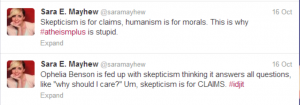Acharya S has had her Facebook account shut down, apparently because she posted a photo of “virginity testing” of little girls in Nigeria. She needs our help pushing Facebook to reinstate her account.
My Facebook account has been permanently disabled because – I’m guessing here – I shared a photo of little African girls suffering a “virginity test.” After I contacted Facebook, I received the following form response, in which, naturally, FB doesn’t give the specific reason:
Hi,
Your account has been disabled because you violated the Facebook Terms.
Unfortunately, we won’t be able to reactivate your account or respond to your email directly.
For more information about our policies, please read the Facebook Community Standards: https://www.facebook.com/communitystandards/
Thanks, The Facebook TeamAs we can see, there is no recourse, no ability to communicate, no consideration for the many years and thousands of posts I’ve made on FB, along with the several pages I created there, including my business pages for Stellar House Publishing and my books.
The (uncensored) photo I posted on Facebook is graphic, as it reveals the horrible TORTURE of little girls. It was published in the mainstream media, perhaps in 2009. I found the photo on Google Images, and include a blurred edition here – I don’t want to lose my blog too! Since it was in the MSM, evidently published in a magazine, and since I am a lifelong scholar of anthropology, I didn’t consider that it was anything but an anthropological news item, like those published in National Geographic for the past century. Apparently, by FB standards it was something else.
Acharya used a blurred version of the picture in her post but I’ll give you the original. With a trigger warning.
[Picture removed because I'm tired of the shouting.]
As we can see from the blurred edition to the right, the image is of a man with a row of little girls in front of him, lying on their backs with their lower bodies naked and legs spread, while he feels around inside them to make sure their hymens are intact. These little half-naked girls are lying on the ground out in the open, in public, with others crowding around and also performing these tests. What an utter humiliation!
For exposing this hideous sexist child abuse, apparently, I’m banned from FB for LIFE.
“For exposing this hideous child abuse, apparently, I’m banned from Facebook for LIFE.”
Just looking at this image, blurred or not, is so very upsetting to me. I cannot stress enough how this traumatizing tradition needs to be stopped! But now, instead of being part of the solution, Facebook’s policies here are only helping to keep this misogynistic behavior alive.
Seriously. The problem is not Acharya posting the graphic image, the problem is what is being done to those little girls.
The photo in question may have been taken in Nigeria, where such virginity tests have been performed frequently. In the past years, a principal in Nigeria was suspended for performing this humiliation on students, while we also read this headline out of Nigeria: “Lagos state seeks 50 virgins to avert flooding”:
Spiritualist who ply their trade in Lagos have warned that the state will experience another deluge of torrential rainfall and flooding of Biblical proportions unless 50 virgins can be found for a ritual to appease the gods.
I have many freethinking Nigerian supporters, and I see Nigeria as one of the places globally where the “light” can come in, so to speak. Let us hope that media suppression such as Facebook’s behavior here does not end this budding African “Age of Enlightenment.”
Why I posted the image
I posted the uncensored, shocking photo on Facebook because it is important to see the utter indignity these poor girls must suffer – this horrible abuse is now being done in the West. How can we battle it, if we can’t see what it is? As we can see from this Google Images search, the photograph is still there – is Facebook going to ban Google Images as well?
This abuse of girls can be found in many areas, including among Muslims and Christians in other countries. Such virginity examination is now spreading to the West. In fact, I attached the apparent FB-offending photo to an article about the battle in Canada to put an end to this practice there: “‘Degrading’ virginity tests on women must stop, Quebec doctors’ group urges.”
Time to rattle Facebook’s cage again.
(This is a syndicated post. Read the original at FreeThoughtBlogs.)

